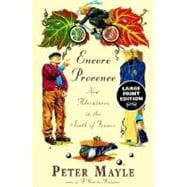
| Second Impressions | p. 3 |
| The Unsolved Murder of the Handsome Butcher | p. 22 |
| New York Times Restaurant Critic Makes Astonishing Discovery: Provence Never Existed | p. 38 |
| Recipe for a Village | p. 53 |
| Curious Reasons for Liking Provence | p. 69 |
| A Beginner's Guide to Marseille | p. 85 |
| How to Be a Nose | p. 100 |
| In Search of the Perfect Corkscrew | p. 116 |
| Eight Ways to Spend a Summer's Afternoon | p. 134 |
| The Genetic Effects of Two Thousand Years of Foie Gras | p. 160 |
| Discovering Oil | p. 177 |
| Friday Morning in Carpentras | p. 194 |
| Green Thumbs and Black Tomatoes | p. 211 |
| P.S. | p. 225 |
| Table of Contents provided by Syndetics. All Rights Reserved. |
The New copy of this book will include any supplemental materials advertised. Please check the title of the book to determine if it should include any access cards, study guides, lab manuals, CDs, etc.
The Used, Rental and eBook copies of this book are not guaranteed to include any supplemental materials. Typically, only the book itself is included. This is true even if the title states it includes any access cards, study guides, lab manuals, CDs, etc.
Excerpted from Encore Provence: New Adventures in the South of France by Peter Mayle
All rights reserved by the original copyright owners. Excerpts are provided for display purposes only and may not be reproduced, reprinted or distributed without the written permission of the publisher.